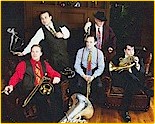|
|
|
 |
|
|
|
|
|
PLUTO, The
Last Planet
|
|
|
|
| The
organist that often performed with Boston Brass
was Robin Dinda.
We did many concerts together, as well as
many Easter and Christmas church services where
he was then employed.
Robin and his wife, Renea Waligora, have
performed extensively as an organ duo. |
 |
|
|
|
|
| Along
the way the topic came up of commissioning a new work
for organ and brass.
Robin mentioned a few composers he knew.
They were contacted, and soon we had a few tapes
to listen to. As
far as guidelines for the composer, the idea was to
create something around the idea of a heroic legend.
The one composer who sounded like he was already
in that frame of mind was named Bruce Edward Miller. |
|
|
|
|
After
discussing the idea with him, he eventually delivered
"PLUTO: The Last Planet".
The title is a tip of the hat to the style of Holst
(and his masterful "The Planets"), and there are
several moments of interstellar magnificence.
|
|
|
|
| These
are the program notes supplied by the composer:
|
|
|
|
| "Pluto:
The Last Planet was commissioned by Boston Brass and
Dr. Robin Dinda, organist.
The work is dedicated to the.
The title gets its name from the suggestion of a
friend's grandson.
He was aware of the work The Planets by
Gustav Holst and knew that it did not include Pluto (the
composition was finished in 1916 and the planet was not
discovered till 1930) and he suggested I write the final
planet -- hence the title.
The players wanted something heroic, uplifting,
lively and perhaps programmatic -- hence the general
tone of the work." |
|
|
|
|
It is
unlike any other work for quintet and organ.
There are many images evoked and plenty of
dramatics for each individual instrument, for the quintet
as a single entity, for the organist, and for the entire
group of six.
|
|
|
|
| On
one of the performances there was in the audience an
elderly woman in a wheelchair.
She had been a professional astronomer and had
been friends with the man who discovered the planet
Pluto in 1930!
|
|
|
|
| Whether
or not the composer has ever published it, it certainly
deserves to be available for many groups to enjoy.
The thrill of the ultimate end of
"PLUTO" is one of the most powerful ways a
program could ever hope to conclude -- playing an encore
would only work if it were repeated.
|
|
|
|
|